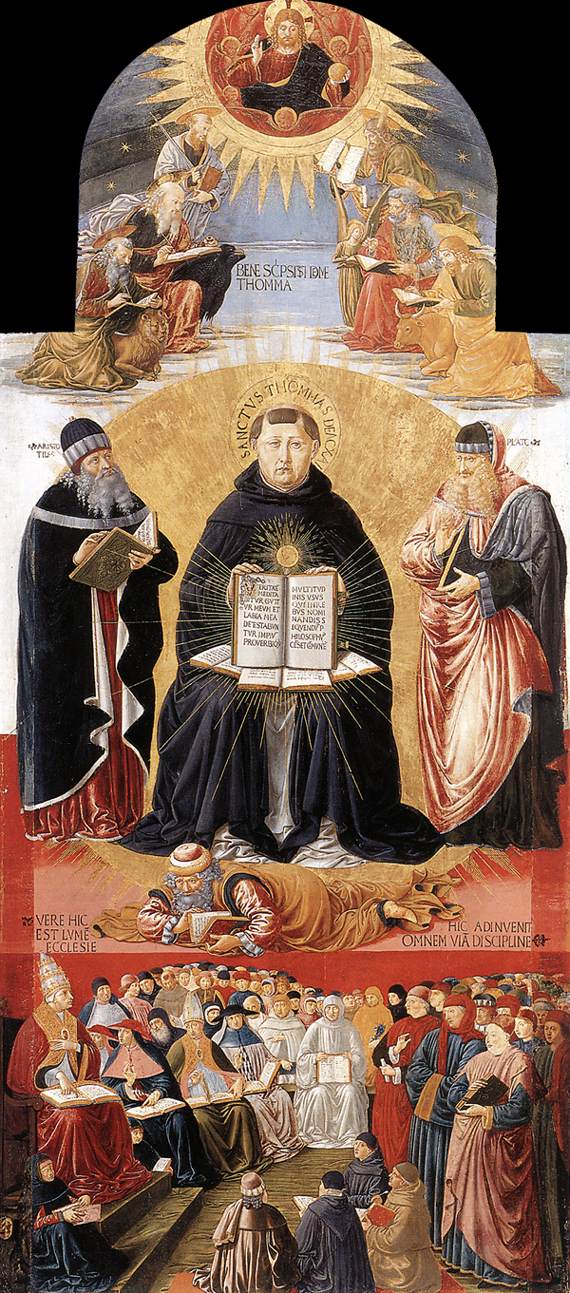
This year we are joyfully celebrating the 700 year anniversary of the canonization of St Thomas Aquinas on July 18, 1323, by Pope John XXII, so it is right and just to appreciate his immense contribution regarding the theology of the Holy Eucharist.
In Aquinas’ theology, Jesus’ Most Precious Body and Blood are entirely one and the same mystery. Thus, in every host, even in its minutest of fragments, Christ is one and whole. Aquinas writes: He is whole and entire and perfect in each and every fragment of the host, as visual appearances are multiplied in a hundred mirrors. Christ’s oneness in this greatest of the sacraments, where God becomes man, boosts us to love others during our earthly journey towards Heavenly Jerusalem. Aquinas states with awe: O unspeakable efficacy of this sacrament, which sets the affections ablaze with the fire of charity, and sprinkles our home’s lintel, on either doorpost, with the blood of the immaculate Lamb! What wholesome journey-provision have we in this food for our precarious sojourning!
The Eucharist is the divine nourishment of the weak and empowers charity. The great Dominican theologian and mystic says: It restores vigor of the weak, health to the sick; it gives increase of virtue, makes grace to abound, purges away vices, refreshes the soul, renews the life of the ailing, knits together all the faithful in the union of charity! No wonder then why we can also refer to the Eucharist is the Church’s pillar and the refuge of all those who left this life marked by the sign of faith. Thus, St Thomas reflects about the Eucharist:This Sacrament of Faith also inspires hope and increases charity. It is the central pillar of the Church, the consolation of the dead, and the completion of Christ’s Mystical Body. By these sacred species we recognize the tree of life
How blessed is the Eucharistic table! Aquinas details its blessing in the following manner: O table of the infinite God! The many marvels of this Feast amaze the mind: it is luscious beyond all dainties, delicious beyond the rarest delicacies, more fragrant than any odor, more pleasing than any form of grace, more desirable than every other food. The Eucharistic Beard is the source of many graces! Aquinas explains: O living Bread, begotten in heaven, warmed in the womb of the Virgin, baked in the furnace of the Cross, brought forth to the altar under the disguise of the wafer: strengthen my heart unto good, make it steadfast on the path through life, make glad my mind, make my thoughts pure! Moreover, he goes on by saying enkindled by the wonder of his ardent faith: This is the true Bread which is eaten and not consumed, eaten and not dissolved, which conveys, without losing, energy. It has power to save, and it completes the work. It is the source of life and fount of grace.
The Doctor of the Eucharist has powerful words for the Chalice of Our Lord’s Blood. O Chalice of sweetness which devout souls drain! O fiery cup, which is sealed in Christ’s blood His covenant; purge out the old leaven, make full the spirit of our minds, that we may be a new paste, feasting with the unleavened bread of sincerity and truth! Amazed by such graces the Eucharist gives Aquinas could simply conclude: Than His Supper can anything be more precious?… Christ Himself, our very God. Than this sacrament can anything be more marvelous?
For Aquinas, it was love which propelled Jesus to institute this greatest Sacrament. It was in order that the boundless goodness of that His great love might be driven home into the hearts of His faithful ones, that when He had celebrated the Passover with His disciples, and the last Supper was ended, … He loved them onto the end ― and instituted this sacrament. The Eucharist is the most eloquent example of Christ’s greatest miracle for us, his very love by which He shared Himself to us till his Second coming through this most august sacrament. Aquinas explains: This sacrament [is] the greatest miracle which He ever wrought, and the one mighty joy of them that now have sorrow, till He shall come again, and their heart shall rejoice, and their joy no man take from them.
The Eucharist is the Sacrament of Christ’s permanent presence. Aquinas tells us: Rightly is He born in Bethlehem, which signifies the house of bread, and who said, I am the living bread, who came down from heaven.
Let us honour and adore Jesus’ presence in the Eucharist and receive Him with humility and purity of heart. St Thomas’ Aquinas’ spiritual theology is of great help towards achieving this most noble purpose.

